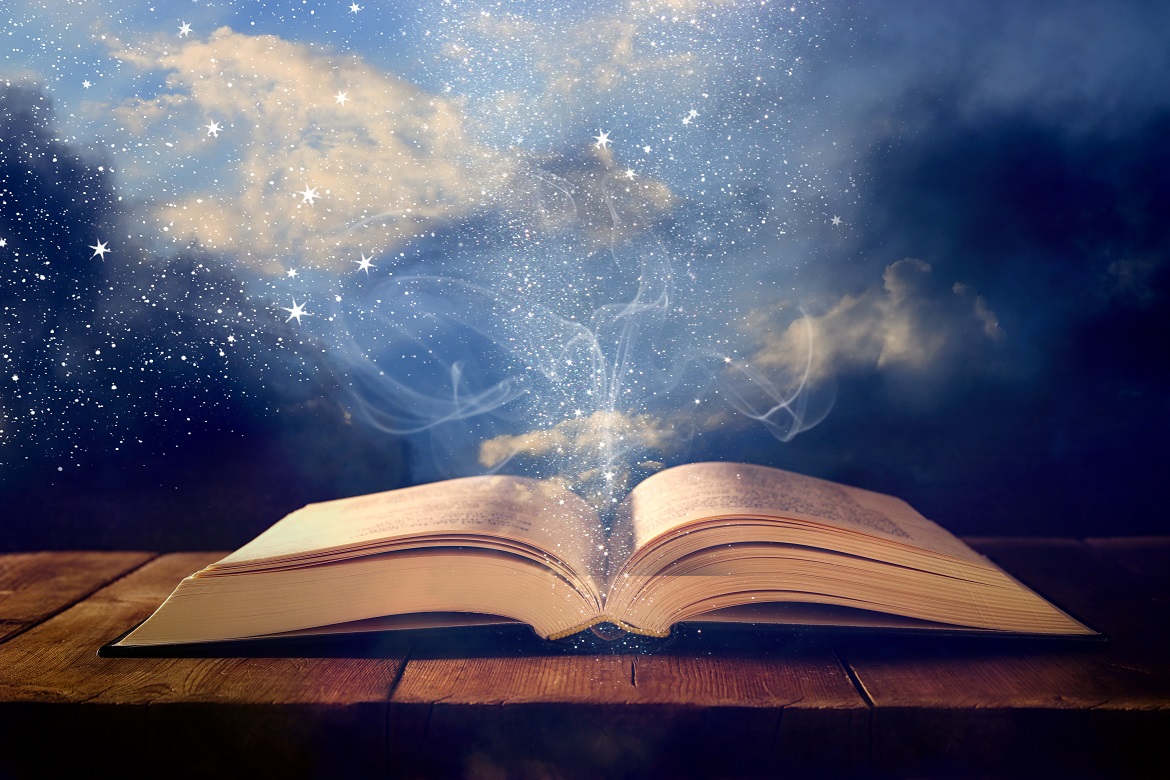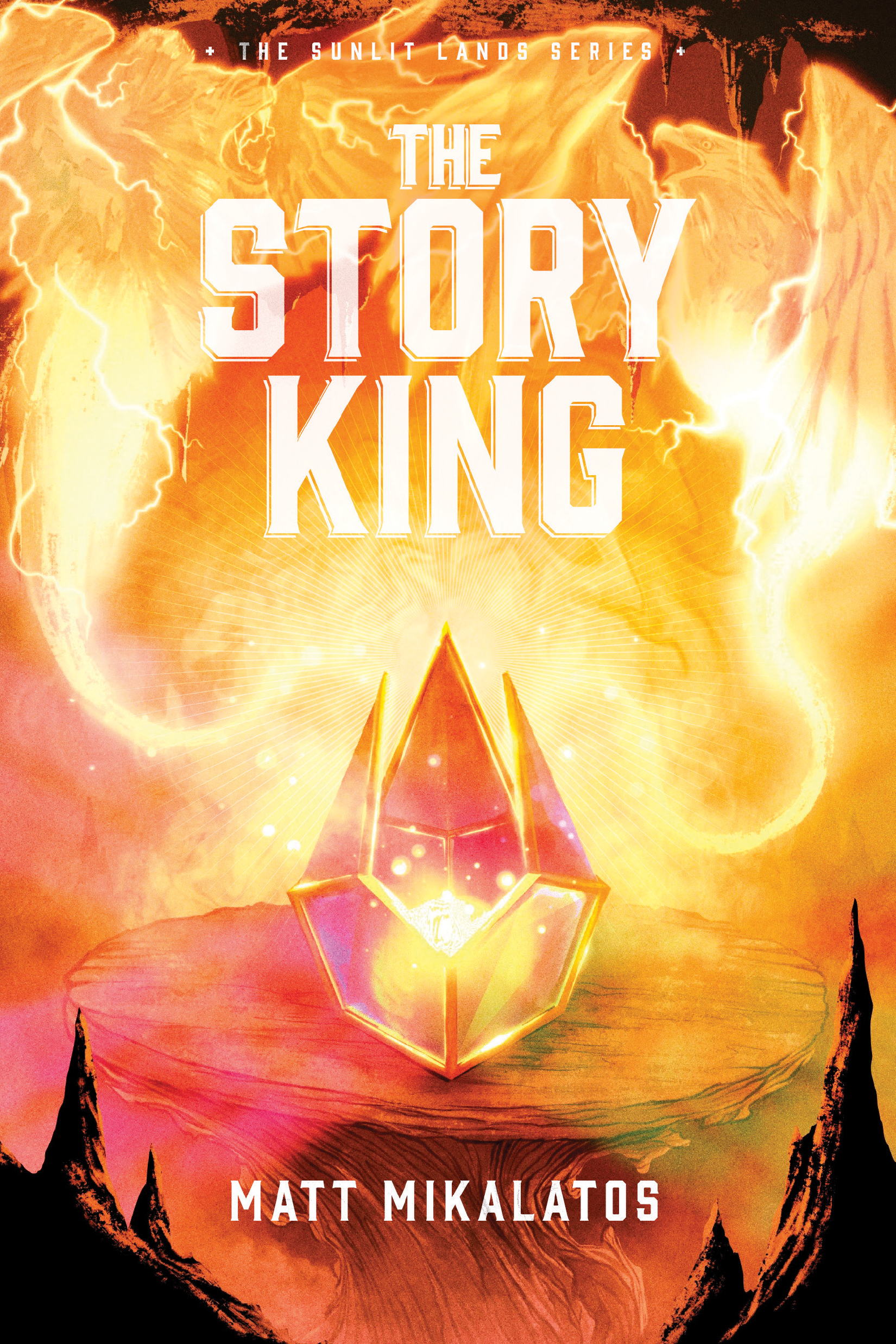In this Author Q&A, Matt Mikalatos talks about his newest release, the research required to write a YA fantasy trilogy, and the writing process.
Matt Mikalatos writes books. (Surprise!) In the past, Matt worked as a high school teacher and a comic book clerk, but currently focuses on nonprofit work devoted to helping people love one another despite their differences. He lives in Portland, Oregon, with his wife, three daughters, two unicorns, a gryphon, a dragon, and three brine shrimp.
- What themes do you explore in The Story King, the third and final book in your Sunlit Lands series?
A key theme in The Story King is the search for “common memory.” Common memory is the idea that we can’t agree on what needs to change in the present if we have disagreements about our past. We have to find a way to recognize the truth of our past, even if that’s traumatic or difficult, or puts us or others we care about in a harsh light. We can’t move forward, in other words, without embracing the truth of our past. And the other theme, really, is about young people coming into power and realizing, “What if we have to start over? What if we have to destroy some of the things we love to build a truly just society?” So in that sense it’s also about loss, and even choosing loss in the hope of greater love and connection.
2. How have these themes developed throughout the series? Specifically, could you share about the theme of sacrifice as it appears in this final book?
In the first two books, a lot of the sacrifice has been carried by one character: Madeline Oliver. But in this book many of her friends realize that they’re going to have to embrace some sacrifice as well, whether it’s acknowledging wrongs in the past, destroying things they love, putting off things they want in relationship, or even giving up a desire for a certain kind of revenge. Even in the beginning of the book, we pick up with Shula, who has taken on a sort of “older sister” parental role with a character from previous books. Jason is in the desert having given up literally everything in the hopes of finding himself, and Darius is risking his life to try to find a way to connect with his friends. So from the first page many of our key characters are already pushing toward sacrifice.
3. What kind of research did you do while writing The Story King?
A shocking amount, actually! There’s a pretty large, multicultural, multiethnic, and multinational cast, so there’s a lot of work to be done to get that (I hope mostly) right, whether that’s a question about what kind of food Shula had for breakfast growing up in the middle east, or questions about music Darius’s grandfather—who has a great deal of surprising backstory—might have run across in his time. And there’s a lot of looking at human history to make sure that the history I’m building in the Sunlit Lands makes sense in the real world. There’s also, of course, a decent amount of running things past people who know all of this better than me to make sure I’m not saying things in a way that seems off.

4. The Sunlit Lands series delves into the subject of privilege from the perspective of the privileged. How do you hope this trilogy will change the way readers think about how privilege influences their own lives?
One thing I love about the Sunlit Lands is that we never fall into easy answers. The most privileged people (people like Hanali and Gilenyia) also have tragic backstories and real problems in the world they’re in. Privilege is really complicated, because a big part of it is the idea that “all other things being equal is THIS thing—money, race, ethnicity, gender, etc.—advantageous?” So someone might be really privileged in one way—incredibly wealthy, say—and also at a huge disadvantage another way (maybe they’re relationally disconnected, for instance). So we have characters like Yenil and Shula, both of whom are orphans. Other characters have the enormous privilege of loving parents (like Madeline) but don’t have their health. Shula had to do some terrible things after she became an orphan, something she worked hard to make sure wouldn’t be true for Yenil. So I hope what these books push us toward is recognizing that most of us have privilege of one kind or another and that in and of itself isn’t evil or wrong or bad . . . in fact it can be used to accomplish enormous good in the lives of people around us. It’s unrecognized or misused privilege that’s dangerous.
5. How have the main characters in this story grown since they were introduced in the first book, The Crescent Stone?
Oh wow. So many ways. They started out as kids at the bottom of the authority chain, and by the end of The Story King most of them are taking responsibility not just for themselves but for the entire Sunlit Lands. Some of them barely knew each other, and now they’re like family. A strong bond of trust has really grown between them.

6. Which scene in The Story King did you most enjoy writing?
It would definitely be spoilers to get too much into this, but I can say that—as you might expect in the last book of a trilogy—there are a lot of goodbyes in this book. It was bittersweet, but I loved writing each character’s final scene and saying goodbye to them. I can’t believe that for some of them this is the end of our journey together, and I might not get to hang out with them again. But there are some really beautiful moments in those last scenes, and I was really thankful to walk with them all the way through the end.
7. How is the perspective of the Sunlit Lands series unique compared to other novels in the YA fantasy fiction genre?
The temptation here is to talk about the magic systems or the way the books interact on really important topics, but I think one of the defining differences is that the young people in these books largely really, honestly, truly love each other. There’s a lot of camaraderie and joy in these relationships, and I love that. These are people who are going to do their best to protect and take care of each other and I think that’s really beautiful. There’s not a lot of in-fighting and no love triangles.
8. How would you describe the role religion plays in this series?
Religion is a really key piece in some ways, especially for Shula and Darius, and in The Story King more than the books before we start to get some insight into the spiritual world that the Sunlit Lands inhabit. There are bigger powers at work than we were led to believe in the past, and some of those are truly vast spiritual presences. These books aren’t like the Narnia books, where Jesus appears but in a fantastic form, but there’s still a nod to the complexity of the spiritual world around us. For those who are looking for spiritual food in these books, they’ll definitely find it. And for those who find those things intrusive, I think they’ll still enjoy themselves . . . it’s not too in-your-face.
9. What are some challenges that come with writing a trilogy, rather than a standalone novel?
Novels are about change. So when you have characters have a really beautiful breakthrough in one novel, that’s wonderful. But when the next novel picks up, they need to grow again, learn a new lesson, overcome a new challenge. So it’s good to have an idea where all of that is going. Some people write, essentially, one giant novel and split it up. I really tried to do three complete stories that built on each other. If you go back and read The Crescent Stone you’ll see little seeds being planted for things that happened in The Story King, and I hope most of the questions people had along the way get answered (I did leave a few mysteries out there for us to explore!).

10. How did you become a writer, and what made you want to write young adult fiction? What about the genre do you enjoy the most?
Writers say this all the time, and it makes people angry, but the way to become a writer is to keep writing. Read a lot, and write a lot. For me, I started writing seriously in college. I wrote a terrible novel (no copies remain) and an awful screenplay (I have one hard copy in my closet). I wrote lots of terrible short stories and parts of awful novels. Then I wrote some things that were okay, then finally some things that were good, and one day I discovered I was writing (and rewriting, that was part of it) work that was professional! I started writing YA around the time my oldest kids were getting serious about reading it. I’ve always loved YA because it typically has a more robust sense of humor, is more honest, and doesn’t mess around when it comes to saying, “This can be a book about changing the world.” I love that, and I wish adult fiction made more room for those sorts of things.
11. How does it feel to have completed this YA trilogy?
You know when you’re on a roller coaster, and there have been a few little drops and turns, and then you’re on this really big, long hill going toward the top, and then there’s this moment where it all feels almost weightless, and then ZOOM you barrel down and spin through a loop, and you’re just screaming and exhilarated all at the same time, and someone is laughing behind you, and the person next to you is screaming, and maybe way in the back someone feels sick, but you’re just throwing your hands in the air, and you’re shouting? And the roller coaster pulls into the station, and you’re a little numb, and your legs are weak, and your hair is sticking out fifteen different ways, and you feel tingly all over. It feels kind of like that.
12. What are some of your other upcoming projects? Do you have any further plans for the characters from the Sunlit Lands?
I would LOVE to do a stand-alone novel with Yenil, and I already have a title and a few ideas for the story. Some of the side characters from the trilogy would make super fun main characters for sure. If I could get away with a novel about Jason, Kekoa, and David I would jump on that without a moment’s hesitation. There are so many fun places in this world we barely got to touch on. That would be so fun. I have a nonfiction book called Journey to Love coming out in August, which is a book about how we can find more love in our lives and be more loving. I’m excited about that, too!
The Story King by Matt Mikalatos
In the third and final installment in the Sunlit Lands series, the magic of the Sunlit Lands has been reset, but that doesn’t mean all is well. Unrest and discord are growing by the day, and Hanali is positioning himself as ruler of the Sunlit Lands. But, in order for Hanali to seize control, there must be a sacrifice, one that very few are willing to make. Jason, Shula, Baileya, and others must work together to save the lives of those Hanali would sacrifice for his own gain.





